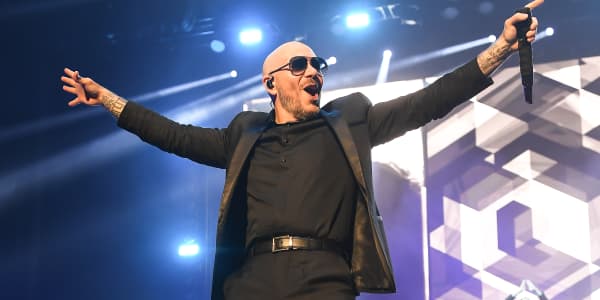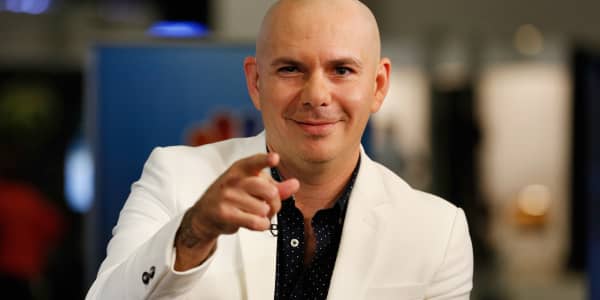Latinos make their mark
In 2012, 1 out of every 6 Americans was Hispanic, according to the U.S. Census Bureau. By 2060, the organization predicts, that number will be 1 in 3.
Hispanic-owned U.S. businesses now stand at 3.1 million—boasting a 40 percent growth rate. And with the growth of the Hispanic community, the number of Hispanic entrepreneurs is increasing as well—especially Hispanics who immigrate to the U.S. A recent Kauffman study found that immigrants are almost twice as likely to be entrepreneurs versus native-born Americans.
The failure rate for Hispanic-owned start-ups is higher than those founded by white or Asian entrepreneurs, according to Kauffman. But there are some significant success stories as well. Here's a look at some of the most notable Hispanic entrepreneurs.
—By Chris Morris, special to CNBC.com
Posted 2 May 2015
Betro Perez, founder of Zumba Fitness
As an aerobics instructor in Columbia, Perez once forgot his usual exercise tapes, so he improvised, adding dance moves to the program. That quick thinking led to a globally recognized fitness empire. The company says 15 million people at 200,000 locations in 180 countries take Zumba classes. That number continues to grow as the company licenses trainers around the world.
Zumba Fitness has inspired a clothing series and even a video game franchise. In 2012, Raine Group and Insight Venture Partners took a minority stake in Perez's business, giving it a valuation of $500 million.
Founded: 2001
Headquartered: Miami
Marcelo Claure, founder of BrightStar
These days, Claure may be better known as the CEO of Sprint, but his road to that job started with the founding of BrightStar, a mobile device distributor that serves more than 200 carriers in 50 countries. The idea for the company started with Claure's purchase of a single store in Boston in 1995. Within two years, that had grown to 150—and included a collection of drivers who delivered phones to customers—and he moved to Miami to launch BrightStar.
Today the company boasts annual revenues of more than $7 billion. In 2013 it received a $2.2 billion valuation when Japan's SoftBank bought a 57 percent stake in the company for $1.26 billion. SoftBank also owns Sprint, which set up Claure's additional role (he's still BrightStar's CEO as well).
Founded: 1997
Headquartered: Hallandale, Florida
Tony Jimenez, founder of MicroTech
Jimenez has been tied to the U.S. government for most of his adult life. He spent 24 years in active military service, both as a combat veteran and later helping the Department of Defense solve a number of platform transformation challenges. When he left the military, it made sense to start a business that would follow a similar path.
MicroTech, which is a contractor on more than 100 Federal projects and specializes in government (and private-sector) computing issues, now manages over 500,000 users per day. And annual revenues are more than $300 million per year.
Founded: 2004
Headquartered: Vienna, Virginia
Maria Contreras-Sweet, founder of ProAmérica Bank
Contreras-Sweet, who has been administrator of the Small Business Administration since April 7, 2014, has had her hands in government since she was 15 years old, when, according to Bloomberg Business, she was approached to work for the speaker of the California Assembly.
But between those two events, she launched ProAmérica, California's first Latino-formed commercial bank in more than 35 years. (The bank currently has a market cap of $4.5 million.) She also founded Contreras-Sweet Enterprises, a marketing and research firm whose clients included The Coca-Cola Company, Pacific Gas and Electric Company and The Walt Disney Company.
Founded: 2009
Headquartered: San Diego
Matias De Tezanos, founder of AutoWeb.com
De Tezanos is a serial entrepreneur, having built and sold three successful ventures. In 2000 he started Hoteles.com, a hotel reservation site for people who speak Spanish. Expedia acquired it two years later. From there it was the online advertising network ClickDiario.com, which News Corp. bought in 2007. He then opened BrokersWeb, a pay-per-click insurance advertising company. By 2011 revenues topped $54 million—when the company merged with Vantage Media.
These days he's CEO of AutoWeb, a pay-per-click marketing network for auto dealers and manufacturers.
Founded: 2013
Headquartered: Miami
Martha De La Torre, founder of 'El Clasificado'
A self-described "reluctant entrepreneur," De La Torre was a fixture in the corporate world as a CPA before diving into start-ups with "El Clasificado," a directory of classified ads targeted at Latino immigrants.
She did consulting jobs on the side to keep the business afloat and thought about walking away at several points in its early years. She didn't, but she did smartly recruit work-study students from a nearby high school (only the ones who were earning A's) and pivoted from a home-delivery method to putting the paper in racks at grocery stores.
In 1996, she acted quickly to launch a Web presence, which receives 24 million monthly page views, and the print publication is now available in 300 cities.
Founded: 1988
Headquartered: Los Angeles
Correction: An earlier version of this article misstated the headquarters of "El Clasificado" due to an editing error. It is headquartered in Los Angeles. Also, the current number of page views the site receives monthly is 24 million, not the 21 million previously reported.
Jordi Munoz, founder of 3D Robotics
While waiting for his green card after moving from Tijuana in 2007, Munoz hacked the sensors on the controller of his Nintendo Wii, wrote some code and gave birth to the first autopiloted drone. On a whim, he uploaded video of the flight to a blog called "DIY Drones."
Chris Anderson, former editor in chief of Wired and founder of "DIY Drones," was so impressed that he sent Munoz $500 to help him continue his work. With that funding, Munoz bought equipment and set up an online store to sell to enthusiasts. Two years later he and Anderson launched 3D Robotics, despite never having met face to face. By 2011 the company had made $5 million in revenue. So far, it has raised $85 million in venture capital. Today it has more than 180 employees in North America and over 30,000 customers worldwide.
Founded: 2009
Headquartered: San Diego
Marc Barros, founder of Contour
Barros was one of the early entrants in the action video camera category, launching Contour two years after GoPro was founded. He started by having an uncle co-sign a $50,000 bank loan and grew it into a company that by 2011 had revenues of $27.3 million, despite almost collapsing during the recession of 2008.
Through a stroke of luck in switching to a more reliable supplier and gambling on the first HD action camera, the company survived. And in 2013 Barros stepped down, saying the company needed "fresh legs and a leader with a different set of experiences." Today he's the co-founder of Moment, which makes attachable lenses for smartphone cameras.
Founded: 2004
Headquartered: Provo, Utah
Andres Ruzo, founder of LinkAmerica
If nothing else, Ruzo is a dedicated entrepreneur. Before starting LinkAmerica, he attempted 17 start-ups, none of which found real traction. But when he got into the telecom world, he found his calling.
Funded with $5,000 and a credit card, the company initially sold refurbished equipment. Within seven years it was a $12 million business. The dot-com bust and 9/11 hit the company hard, though: The employee count fell from 100 to five.
Ruzo pivoted, changing the focus several times and eventually finding a market by providing service support to tech and telecom companies. In 2013 the company made $180 million.
Founded: 1994
Headquartered: Rowlett, Texas
Cynthia Rubio, founder of Radiant RFID
When Rubio founded her company, RFID chips were primarily used by companies to track pallets as they moved across the country. Radiant pushed clients to expand that vision, letting them track people with RFID wristbands (which can help in disaster recovery efforts) or using the technology on complex technologies and specialty equipment.
A former stay-at-home mom, Rubio has a degree in mechanical engineering and once worked at Ford. She started the company with her husband after their third child was born. It turned heads with its assistance in evacuations for Hurricanes Gustav and Ike (where 27,000 displaced people were tracked with the wristbands). In its 10-year history, the company has tracked more than $4 billion in assets—and 2011 revenues (the most recent available) hit $6.3 million.
Founded: 2004
Headquartered: Austin, Texas



